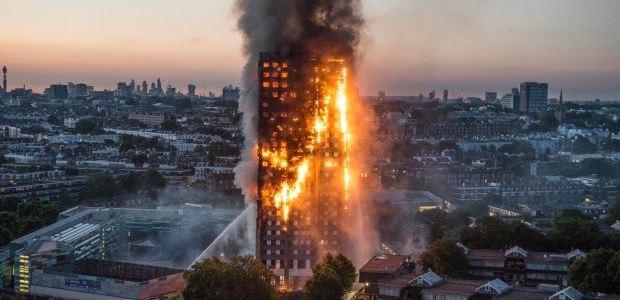
Inquiry Hears LFB Personnel Testify About Grenfell Fire
"To see a flame growing like that, I'd say that is unusual," Firefighter Michael Wood says in his statement. "In the fires I have seen, and I've been to loads, normally you'd get a lot more smoke. It was like the fire was overtaking the smoke almost. I have never seen anything like it before. I have been to a lot of fires, big buildings alight, but none that moved as quick as this."
Several employees of the London Fire Brigade are testifying this week before the Grenfell Tower Inquiry about what they experienced the night of the fire, which gutted most of the London high-rise tower and killed 71 people. The LFB witnesses have included Control Room Officers -- dispatchers -- and a firefighter named Michael Wood who responded to the June 14, 2017, fire.
In his statement, Wood says the initial call to his station was a "forty pump" call, meaning a fire so large that 40 fire engines are needed on scene. When they reached the tower, he describes the fire itself as "bright orange, big and violent which is unusual because when you turn up to a lot of fires, there is usually more smoke than flame. . . . To see a flame growing like that, I'd say that is unusual," he continues. "In the fires I have seen, and I've been to loads, normally you'd get a lot more smoke. It was like the fire was overtaking the smoke almost. I have never seen anything like it before. I have been to a lot of fires, big buildings alight, but none that moved as quick as this."
Wood says before the Grenfell fire, he was unaware of the risk presented by cladding panels, but since then, LFB firefighters have had training about them. Combustible cladding used on the tower has been a key issue in the inquiry. Lawyers for the company that made the cladding told the inquiry that its panels were not responsible for spreading the fire and were "at most, a contributing factor." One of the inquiry's fire safety experts had said the cladding system contributed to the fire's rapid spread and bears much of the blame for the tragedy.
Control Room Officer Angie Gotts explains in her statement that normal advice to fire calls to high-rise buildings always has been to shelter in place. She says she had never heard of the Grenfell Tower before the night of the fire, and she took about 80 calls during her shift that night. "Initially the advice to give residents was to remain," she says. "I remember at some point in the night, someone shouts that the advice was to get out. I do not know what time this was said.
"After the last call, I think it was about 5 a.m., there was a lull," she says. "That was horrible. You could not help but think that they had all gone. Then relatives sarted calling and asking about family members. They feared the worst and that was why they were ringing. The lack of calls made it eerie in the Control Room. Someone said, 'What does this mean?' but we all know what it meant. Someone looked it up on their computer on the news and it was horrific. I could not look at it."
Another Control Room Office, Peter Duddy, says in his statement that the shift in advice to callers was made at 2:40 a.m. "We use a stay put policy because high rises are supposed to be self-contained units with a minimum safety time. To suddenly be telling people that they need to get out and get down the stairs was totally alien to us, and we were suddenly in an unprecedented place."
The inquiry is charged with investigating what caused the fire and why so many lives were lost, examining the tower's design and renovations, fire and safety measures in place in the building at the time of the fire, management of the tower and communication with residents, and the response from central and local governments to recommendations arising from other fires.